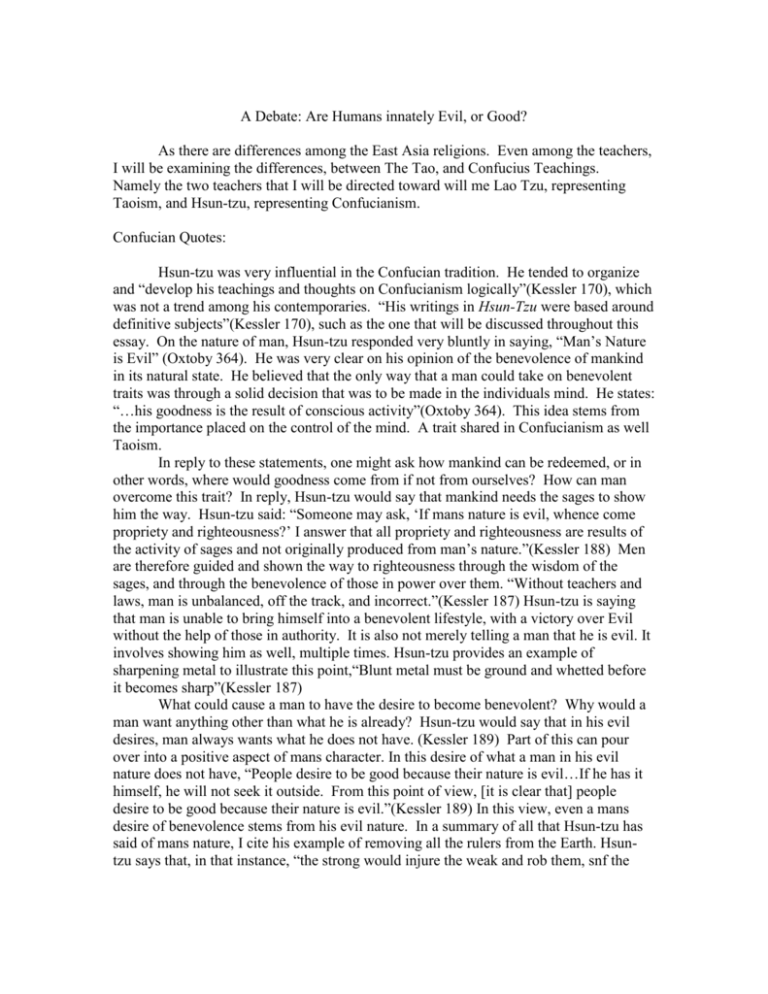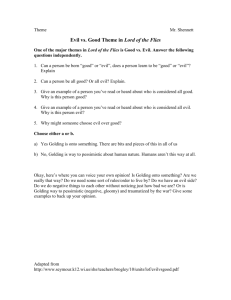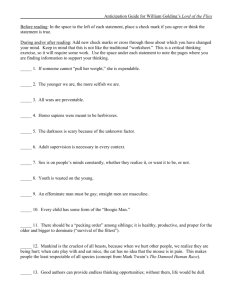Daniel Wynn
advertisement

A Debate: Are Humans innately Evil, or Good? As there are differences among the East Asia religions. Even among the teachers, I will be examining the differences, between The Tao, and Confucius Teachings. Namely the two teachers that I will be directed toward will me Lao Tzu, representing Taoism, and Hsun-tzu, representing Confucianism. Confucian Quotes: Hsun-tzu was very influential in the Confucian tradition. He tended to organize and “develop his teachings and thoughts on Confucianism logically”(Kessler 170), which was not a trend among his contemporaries. “His writings in Hsun-Tzu were based around definitive subjects”(Kessler 170), such as the one that will be discussed throughout this essay. On the nature of man, Hsun-tzu responded very bluntly in saying, “Man’s Nature is Evil” (Oxtoby 364). He was very clear on his opinion of the benevolence of mankind in its natural state. He believed that the only way that a man could take on benevolent traits was through a solid decision that was to be made in the individuals mind. He states: “…his goodness is the result of conscious activity”(Oxtoby 364). This idea stems from the importance placed on the control of the mind. A trait shared in Confucianism as well Taoism. In reply to these statements, one might ask how mankind can be redeemed, or in other words, where would goodness come from if not from ourselves? How can man overcome this trait? In reply, Hsun-tzu would say that mankind needs the sages to show him the way. Hsun-tzu said: “Someone may ask, ‘If mans nature is evil, whence come propriety and righteousness?’ I answer that all propriety and righteousness are results of the activity of sages and not originally produced from man’s nature.”(Kessler 188) Men are therefore guided and shown the way to righteousness through the wisdom of the sages, and through the benevolence of those in power over them. “Without teachers and laws, man is unbalanced, off the track, and incorrect.”(Kessler 187) Hsun-tzu is saying that man is unable to bring himself into a benevolent lifestyle, with a victory over Evil without the help of those in authority. It is also not merely telling a man that he is evil. It involves showing him as well, multiple times. Hsun-tzu provides an example of sharpening metal to illustrate this point,“Blunt metal must be ground and whetted before it becomes sharp”(Kessler 187) What could cause a man to have the desire to become benevolent? Why would a man want anything other than what he is already? Hsun-tzu would say that in his evil desires, man always wants what he does not have. (Kessler 189) Part of this can pour over into a positive aspect of mans character. In this desire of what a man in his evil nature does not have, “People desire to be good because their nature is evil…If he has it himself, he will not seek it outside. From this point of view, [it is clear that] people desire to be good because their nature is evil.”(Kessler 189) In this view, even a mans desire of benevolence stems from his evil nature. In a summary of all that Hsun-tzu has said of mans nature, I cite his example of removing all the rulers from the Earth. Hsuntzu says that, in that instance, “the strong would injure the weak and rob them, snf the many would do violence to the few and shout them down. The whole world would be in violence and disorder and all would perish in an instant.”(Kessler 189) In opposition to the idea of man being inherently evil, would be the Taoist teacher, Lao Tzu, writer of the Tao Te Ching. He would argue not that man is naturally good, but that man is neither good, nor evil upon his birth. Lao Tzu (from the Tao Te Ching) “ When they all know the good as good, there arises the recognition of evil”(Kessler 237) Good and Evil are the same. In the same relationship that being and non-being are the same. Tzu says, “Therefore let there always be non-being, so we may see their subtlety, and let there always be being, so we may see their outcome. The two are the same, but after they are produced, they have different names.” “The best I think that Lao Tzu would answer by saying that there is no evil, in the definition of good vs bad. As a result, there would be no inherent character trait that would show its dominance in a man. Neither good nor evil is the essence of a mans character, only the Tao, which cannot be classified except by saying that it is part of everything, and it is the natural course of life. Good and evil are merely rotations of the cycle. One must give way for the other to take its place, yet while the one gives way, the other is taking its place as well. So neither is completely done away with. In Confucianism, perfection is possible in the essence that man can turn his evil nature into a benevolent one. This idea, in this form is not possible through the Tao. Perfection is achieved by maintaining a balance between the yin and the yang.






